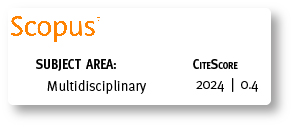Construcción de objetos virtuales de aprendizaje aplicando ingeniería de software
Abstract
RESUMEN
En este artículo se presenta una experiencia de la Universidad Técnica de Ambato, Ecuador, en el uso de la metodología de ingeniería de software para desarrollar objetos de aprendizaje (ISDOA) en la creación de Objetos Virtuales de Aprendizaje (OVA), a través del desarrollo de un proyecto en el cual se creó un primer OVA para ser utilizado en la plataforma virtual de aprendizaje (EVA) de la carrera de Ingeniería en Sistemas. El uso de este OVA ha permitido mejorar el proceso de enseñanza-aprendizaje en el sistema presencial de la universidad, ayudando a los estudiantes a adquirir más conocimientos mediante la vinculación de la teoría y la práctica con el uso de simulaciones en 3D.
Palabras clave: Objetos Virtuales de Aprendizaje, Ingeniería de Software, Plataforma Virtual de Aprendizaje.
ABSTRACT
This article presents the results of the use of SEDLO methodology at the Universidad Técnica de Ambato for the creation of virtual learning objects (OVA). The project was developed in the Facultad de Ingeniería en Sistemas, Electrónica e Industrial, and enabled the creation of an OVA that was used in the virtual learning platform (EVA) of the university, specifically for the Software Engineering career. The use of OVA improved the traditional teaching-learning process in the classroom, helping students to acquire more knowledge by linking theory with practice through 3D simulation.
Keywords: Virtual learning objects, software engineering, virtual learning platform.
Downloads
Metrics
References
López R., D. Nelson, Á. Franco, 2013. Nuevas formas de enseñar y aprender. [Online]. Disponible en: http://www.colombiaaprende.edu.co/html/directivos/1598/article-88892.html#h2_1, Consultado el 24 Sep. 2015.
Margain, M, J. Muñoz, F. Álvarez, 2009. Metodología de Aprendizaje Colaborativo fundamentada en patrones para la producción y uso de Objetos de Aprendizaje. Revista Investigación y Ciencia, 44, 22-28.
Martínez, A., 2009. Innovación y competitividad en la sociedad del conocimiento. México: Plaza y Valdés Editores, 568 pp. Moral, E., D.A. Cernea, 2005. Diseñando Objetos de Aprendizaje como facilitadores de la construcción del conocimiento. Proc. II Simposio Pluridisciplinar sobre Diseño, Evaluación y Descripción de Contenidos Educativos Reutilizables. Barcelona, España: SPDECE. Disponible en http://www.uoc.edu/symposia/spdece05/pdf/ID16.pdf. [Consultado el 17 Sep. 2015].
Object Management Group, 2013. Introduction to OMG’s Unified Modeling Language. Disponible en http://www.omg.org/gettingstarted/what_is_uml.htm. [Consultado el 18 Sep. 2015].
Parra, E., 2011. Methodology Proposal of Software Development for Virtual Learning Objects -MESOVA-. Revista Virtual Universidad Católica del Norte, 1, 113-137.
Sandoval, E., C. Montañez, L. Bernal, 2013. UBoa - Metodología para la creación de Objetos de Aprendizaje de la Universidad de Boyacá. Boyacá, Colombia.
Scalone, F., 2006. Estudio comparativo de los modelos y estándares de calidad del software. Tesis de Magister, Universidad Tecnológica Nacional, Buenos Aires, Argentina.
Senplades, 2013. Plan Nacional del Buen Vivir 2013 - 2017. Ecuador. [Online]. Disponible en: http://www.buenvivir.gob.ec/documents/10157/26effa35-aaa8-4aec-a11c-be69abd6e40a. [Consultado el 27 Sep. 2015].
Serna, E.M., 2012. Análisis y comparación de las propuestas recientes para diseñar casos de prueba desde los casos de uso orientados a verificar los aspectos funcionales del software. Tesis de Magíster, Universidad Nacional de Colombia, Medellín, Colombia.
Serna, E., C. Castro, T. Botero, 2012. SEDLO: software engineering for developing learning objects, Proc. 6th Euro American Conf. on Telematics and Information Systems (EATIS), Valencia, Spain. Disponible en http://dl.acm.org/citation.cfm?id=2261605.2261658&coll=DL&dl= ACM&CFID=235692483&CFTOKEN=65203704. [Consultado el 24 Sep. 2015].
Thayer, R.H., 2002. Software System Engineering: A Tutorial. En: Thayer, R.H., M. Dorfman (Eds.), Software Engineering, 1: The Development Process (2nd ed.). Los Alamitos, CA: IEEE CS Press, pp. 97-116.
Downloads
Published
How to Cite
Issue
Section
License
Copyright © Autors. Creative Commons Attribution 4.0 License. for any article submitted from 6 June 2017 onwards. For manuscripts submitted before, the CC BY 3.0 License was used.
![]()
You are free to:
 |
Share — copy and redistribute the material in any medium or format |
 |
Adapt — remix, transform, and build upon the material for any purpose, even commercially. |
Under the following conditions:
 |
Attribution — You must give appropriate credit, provide a link to the licence, and indicate if changes were made. You may do so in any reasonable manner, but not in any way that suggests the licenser endorses you or your use. |
| No additional restrictions — You may not apply legal terms or technological measures that legally restrict others from doing anything the licence permits. |









